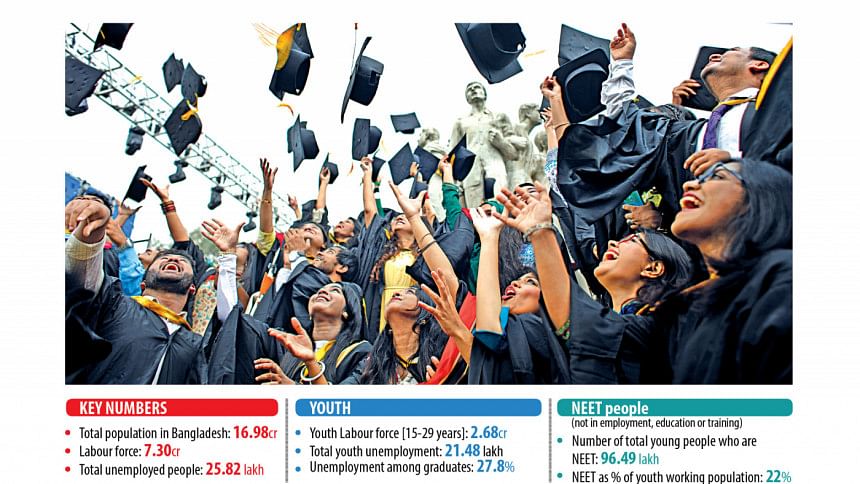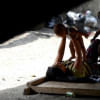What’s missing for young people in the budget?

Bangladesh's high youth unemployment rate necessitates specific remedial steps, including ways for employment generation and adoption of prerequisite education and training, which the proposed national budget for fiscal year 2024-25 did not include, according to analysts.
Moreover, it does not delineate a definite plan addressing the needs of youth who are not in education, employment or training (NEET), they said.
The budget provided little hope to young people, talking about initiatives the state has already taken towards the creation of vocational training facilities.
This contradicts the priority paced by the incumbent government, which has come to power for a fourth consecutive term in January this year, on employment generation in tune with the nation's 8th Five-Year Plan.
According to Labour Force Survey 2022 of the Bangladesh Bureau of Statistics (BBS), there were 7.30 crore people in the labour force.
Of them, 2.68 crore were youths, meaning those between the ages of 15 to 29 years.
Around 21.48 lakh of these youths were unemployed. This is 83 percent of the total unemployed people in Bangladesh.
Of the unemployed youths, 28 percent have passed the tertiary level of education or graduates.
A study by the Bangladesh Institute of Development Research recently revealed that as many as 28 percent of students remain unemployed even three years after graduating from the colleges under National University.
Besides, there are 96.49 lakh youths under the NEET category. Of them, 63 lakh are females.
"The youth and the job seeking population as a whole have been left to fend for themselves. There is no good news for them," said Rizwanul Islam, a former special employment adviser of International Labour Organization.
There has been a lot of talk on issues like youth unemployment in recent times and not over NEET. "And yet, the budgetary exercise has not shown any sensitivity to the situation," he said.
Islam added that employment was not an issue to be dealt with just by one budget or any other instrument through a one-off intervention.
"It requires a multi-pronged approach with an integrated application of monetary, fiscal, industrial, trade and other policies. There has never been such an approach in Bangladesh," he said.
"Even if one talks about limited fiscal intervention, this year's budget is an example of broken promises and dashed expectations in that there were some mentions of it in the ruling party's election manifesto and in the pre-budget statements," he said.
"And yet, one finds precious little in the actual budget."
Islam added that when an economy goes through a growth recession, the strategy could be recalibrated to seek more jobs from a given amount of output growth. "No thinking along such lines is seen," he said.
Economist Hossain Zillur Rahman said: "In this proposed budget, the youth is a kind of ignored or overlooked subject. Adequate understanding of the issues of young people is missing."
The existing budget for fiscal year 2023-24, which ends this month, contains a Tk 100 crore special allocation for the youth and women to facilitate professional skills development, he said.
But there has been no such announcement for the next fiscal year and no follow-up on the existing allocation, he said.
"What has happened to the fund?" questioned Rahman, also executive chairman of the Power and Participation Research Centre.
"It seems that they take sudden one-off decisions without following a systematic way," he said.
Bangladesh is passing through a critical time when it is crucial to reap the demographic dividend and for this, issues involving young people are vital, added Rahman, also chairman of BRAC, the world's largest NGO.
Towfiqul Islam Khan, a senior research fellow at the Centre for Policy Dialogue, said employment creation has been featured as a priority in the election manifesto of the incumbent government.
"Regrettably, the budget did not mention any target for the upcoming fiscal year," he said.
Vocational training programmes gained importance in this budget in tune with that over the last couple of years, he said.
In his budget speech, Finance Minister Abul Hassan Mahmood Ali, who placed his maiden budget, said there was an ongoing programme to establish 100 technical schools and colleges in each of the 100 upazilas.
Of them, 91 newly-constructed technical colleges have started educational programmes. He also mentioned that the establishment of four women's polytechnic institutes in Sylhet, Barishal, Rangpur, and Mymensingh divisions was underway.
The government is also setting up four engineering colleges in Chattogram, Rajshahi, Khulna and Rangpur. It is acquiring land to establish technical schools and colleges in 329 upazilas.
"While skilled people are important to ensuring quality supply in the labour market, an incremental demand from the private sector would ensure job creation," said Khan.
Private investment is a major factor for job creation and it must be increased, he said.
In the post-Covid era, the BBS statistics indicate that new jobs were largely created in the agriculture sector, which accounts for 45 percent of the labour force, he said.
Indeed, the services sector should now get focus from an employment perspective, he added.
Sayema Haque Bidisha, a professor of economics at the University of Dhaka, said the government usually sets lofty goals for job creation in its budget. But it rarely is achieved through actual expenditure, she said.
In his budget speech, Finance Minister Ali said 37.46 lakh young people have been provided with skills development training from FY09 until February of FY24.
In the same period, it gave Tk 1,437 crore in loans to the youth, he said.
Thanks to this initiative, skilled youth became self-reliant through self-employment, he said.
However, the finance minister did not specify the number of people who got jobs.
Haque suggested that the government adopt separate programmes for rural and urban areas targeting young people who fall under the NEET category.

 For all latest news, follow The Daily Star's Google News channel.
For all latest news, follow The Daily Star's Google News channel. 










Comments